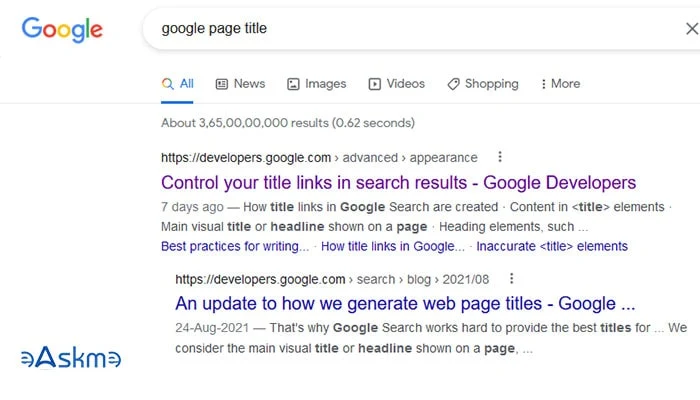Google explains the best practices to write page titles and post descriptions.
In a new document, Google has published best practices for writing page titles and descriptions. And, everyone follows what Google says.
The new title and description writing tips explain how users can stop Google from replacing titles in search results.
 |
| Google’s New Best Practices For Writing Page Titles: eAskme |
Google page title update has changed the way Google treats titles in SERP. Now, Google is replacing links in search results to make them discoverable.
Only 20% of the page titles are being replaced. Yet, it has caused massive confusion among web admins and SEOs.
In Google’s advanced SEO document of Google Search Central, the search giant has described the best practices for writing page titles and descriptions.
Google has also addressed the common issues when replacing titles.
And, today you will know everything about how Google wants you to use work on titles.
Google’s best practices to Write title Links:
The title link is the title that takes the user from the result to the landing page.
Earlier “Title links” were known as “meta-Titles.”
You can use the <title> element to writing the best link copy for the search result.
Here are Google’s best practices for title writing?
- Write a title for each page on your website.
- Write unique titles for each page.
- Write concise titles.
- Write descriptive titles.
- Don’t repeat text in titles.
- Title branding.
Follow these title writing practices to avoid Google from replacing your title.
How Google Create Title Links?
Title links in SERP change according to the relevance and content on the web.
Google’s focus is to display user-friendly titles.
Google uses the following sources to generate title links:
- Text in <title> element.
- Visuals and headlines.
- Heading elements like <h1>
- Large and prominent treatments.
- Other relevant text.
- Anchor text
- Text within links.
If you still have any question, feel free to ask me via comments.
If you find this article interesting, don’t forget to share it on Facebook, Twitter or Google Plus with your friends and family.
Don't forget to like us FB and join the eAskme newsletter to stay tuned with us.
Time to boost your SEO with These Articles for You:










